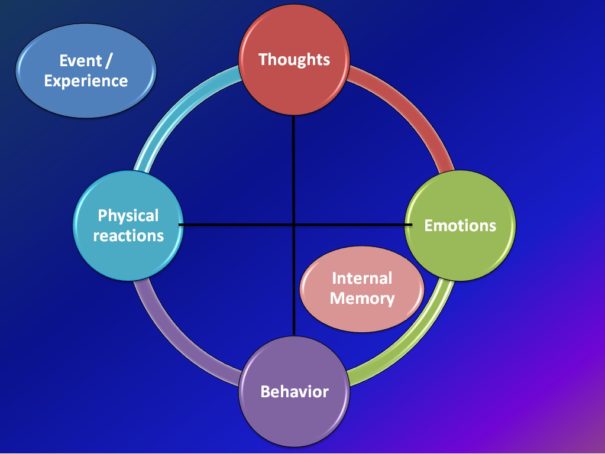Emotion Regulation Part 2: Understanding the emotional process

In part 1 of this series I talked about learning to identify and label the emotions that we experience in different circumstances.
In Part 2 of this series I would talk about how we can understand our emotional process better so that we get a better hang of managing and regulating our emotions.
There are four distinct components to any experience that we have. Any event or incident or memory that we experience creates a series of processes in us which we can learn to be aware and identify. The event/experience is interpreted based upon our own set of past experiences and learning which give rise to a set of thought processes/interpretations regarding the event or experience or memory. This also gives rise to a set of emotions, and also a set of bodily or physical reactions that can arise. Based upon our thoughts, emotions and physical reactions we might engage in a set of behaviors as well. The current emotional state can also influence how the interpretation of the event is done and influence the bodily reactions as well.
The diagram above showcases the different components of any experience and also the relationship between all of them. You will notice that that each one of these component can affect and influence each other.
So if you want to understand the emotional process better with the intent to regulate the same, then the following steps can be followed. As I mentioned in part 1 it is a good practice to maintain a small notebook or a journal in which you can write down a descriptive of your experience with respect to these components.
- The Event
Write down the event that is happening or happened or the memory of the event from the past, or a current incident that triggers these memories. Describe the events in as much detail as possible, without judging the same.
- The immediate thoughts and the meaning assigned
Write down the thought process or the images in your mind that occurs to you when the event happened when you experienced it or post the event. Also write down your interpretation of the event, in other words the meaning that you assigned to the event.
- Label the emotions that arise
Based upon the interpretation or meaning that you assigned to the event or incident, one or more emotions might arise. Identify the emotions and label them accordingly.
- Physical Reactions
Scan your body for any physical reaction in any part of your body from the top of your head to the tip of your toes. These physical reactions could be, any tingling in a particular body part, tightness, warmth, chill, breathing patterns, heart rate, sweating, choking, etc or any other physical feeling that is different from normal.
- Behavioral response / Action
What did you do about it? How did you express your thoughts and how did you express your emotions ? What behavior did this result in? What action did you take about it? How did you feel after this expression or behavior? Was the outcome helpful to you or unhelpful to you? You might have raised your voice, gone silent, cried, walked away, talked about it in a calm way and so on. Describe your behavior/behaviors.
Writing down these would give you a good insight about your own internal processes with respect to how you make sense of an event or memory and how that results in set of feelings or emotions and how that influences your actions or behavior subsequently. IT might surprise you that you may have never given so much attention to the process that happens internally, and this insight can help you manage your emotions and behavior better.
About the Author:
Kala Balasubramanian is certified Counselling Psychologist/Psychotherapist with a Masters in Counselling and Psychotherapy, Diplomas in Counselling and has further certifications specializing in couple/marriage/relationship counselling and family counselling. As a professional counsellor she provides a supportive, understanding, professional and confidential environment to work with clients – Individuals and Couples, help explore their emotions, facilitate them to understand and manage their challenges, relationships and stress better.
